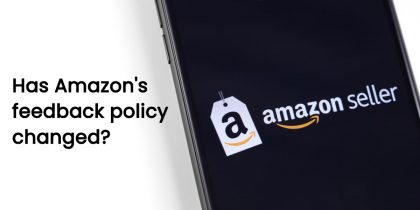Selling on Amazon
Have you ever thought about starting your own business selling on Amazon? The biggest benefit to selling on Amazon is access to millions of engaged consumers. Amazon provide a ready-made stream of loyal customers. They expect great value products, plenty of choice, excellent customer service and fast delivery.
The better you understand how Amazon works, the easier it will be to start a business and begin growing your sales. Product sourcing, listings, pricing, shipping and customer support are key elements of selling on Amazon that you’ll need to get to grips with.
In this blog, we explore the basics to help you get started.
How do I get started?
Head over to Amazon Seller Central and create an account in your domestic marketplace to begin with. The first thing you’ll need to decide is whether you’re going to use an individual seller account or a pro seller account. There are a few category criteria that need to be met here, so take your time and investigate the options.
It’s generally advised to go for the pro account if you want to become a serious seller. As a rule, if you expect to sell more than 40 products a month, then a pro account is best. It costs £25 / $39.99 per month and gives you everything you need to get your Amazon store up and running.
Selling on Amazon: Key factors to consider
Sourcing – You’ll need to discovered a niche where there’s demand for your product. There are no hard and fast rules but it helps to have some knowledge of the products you want to sell. Think outside the box. Choosing popular categories, like t-shirts, books and cameras, can make it hard to compete and achieve a realistic margin.
Conduct keyword research on marketplaces and search engines to get a better idea of the demand for a product and the price you can achieve. There’s nothing wrong with selling plumbing supplies or electrical fittings, for example. Whatever you choose, within the rules, it must make you a profit after deducting all selling costs. It takes time and commitment to research a niche thoroughly, there’s no silver bullet. As an online seller you learn by doing, don’t be afraid to experiment until something clicks.
Listings – You can’t begin selling on Amazon or receive any orders until you’ve listed your products. To add inventory to your Amazon store you need to provide important product details, unique descriptions and images of your products. Be aware of Amazon’s extensive listing requirements, which are documented in seller central.
With the sheer number of products available on Amazon, it’s critical to optimize your listings to get them found. Amazon attract buyers by matching them quickly and accurately to the right products. Optimizing your product listings, means giving them relevant key words and search terms to get them found and help customers compare product features and uses.
Shipping and Logistics – During the listing process, you must specify shipping options for each product, which countries you’ll deliver to and how much it’ll cost the buyer in addition to the item cost. There are several options to deliver you items including postal services and couriers.
It’s worth looking at Fulfilled by Amazon (FBA). When an FBA order is placed, Amazon handle the packaging and shipping. This can save you time and trouble when it comes to managing your stock because you don’t need to deal with returns and shipping directly. One major benefit of this method is that Amazon handle all the customer support. That can help stop negative feedback and shipping errors being attributed to you, the seller.
Amazon has a vast logistics network and can offer quick delivery. Amazon charge a fee for collecting, storing, packing and delivering your items. It can still be cost effective depending on your business model and the type of products you sell. Some sellers prefer to retain control of their inventory management, shipping and customer support rather than outsource it to Amazon.
Customer Support – Whether it’s about products and pricing, shipping or packaging, first contact is your chance to align your business with your customers’ needs. By organizing your business to respond quickly you take control and help the buyer make decisions. You encourage buyers to act by anticipating issues that might divert them from purchasing. Amazon have a minimum 24-hour customer response guideline that must be met.
Negative feedback is something anyone selling on Amazon should avoid. When mistakes happen, as they sometimes do, you’re judged on how well you fix them. Resolution times are the critical measure of your success in solving problems. The quicker you identify problems, the more time you have to sort them out and influence the buyer’s opinion of you. When you acknowledge a customer’s concerns and show you’re actively helping, you make the resolution process transparent.
Customer Support is a constant process that can always be improved. When you receive an incoming Amazon message it’s important to:
- Match the query to the buyer’s order
- Respond quickly to convert more sales
- Know exactly when the item was shipped
- Identify negative feedback and respond early
- Prioritize the messages that matter
Competitive Pricing – The Amazon marketplace is very competitive, prices move up and down constantly. Depending on your product category, there can be several sellers competing to win the customer’s attention and make the sale. The best way to increase sales is to win the Amazon Buy Box where 90% percent of sales are made.
The objective is to win the Buy Box and make more sales without sacrificing your profits. That means having a competitive pricing strategy.
To change your prices in order to be competitive, there are two options. You can update your prices manually or use an automated repricing tool. Manual repricing involves constantly monitoring your competitors prices. The main benefit of using an Amazon repricer is increasing sales by reacting quickly to competitor price changes to win the Amazon Buy Box.
With an advanced Amazon repricing tool you can set rules to compete in a granular way based on a range of competitive scenarios. These include fulfilment method, stock level, location, customer metrics and feedback scores. Repricing rules allow you to price above certain competitors and still make the sale.
xSellco is the leading provider of software tools that help Amazon sellers become more profitable. Are you interested in learning about the benefits of real-time Amazon repricing? Try xSellco Price Manager on a free 14-day trial or contact a member of our team to book a demo.








